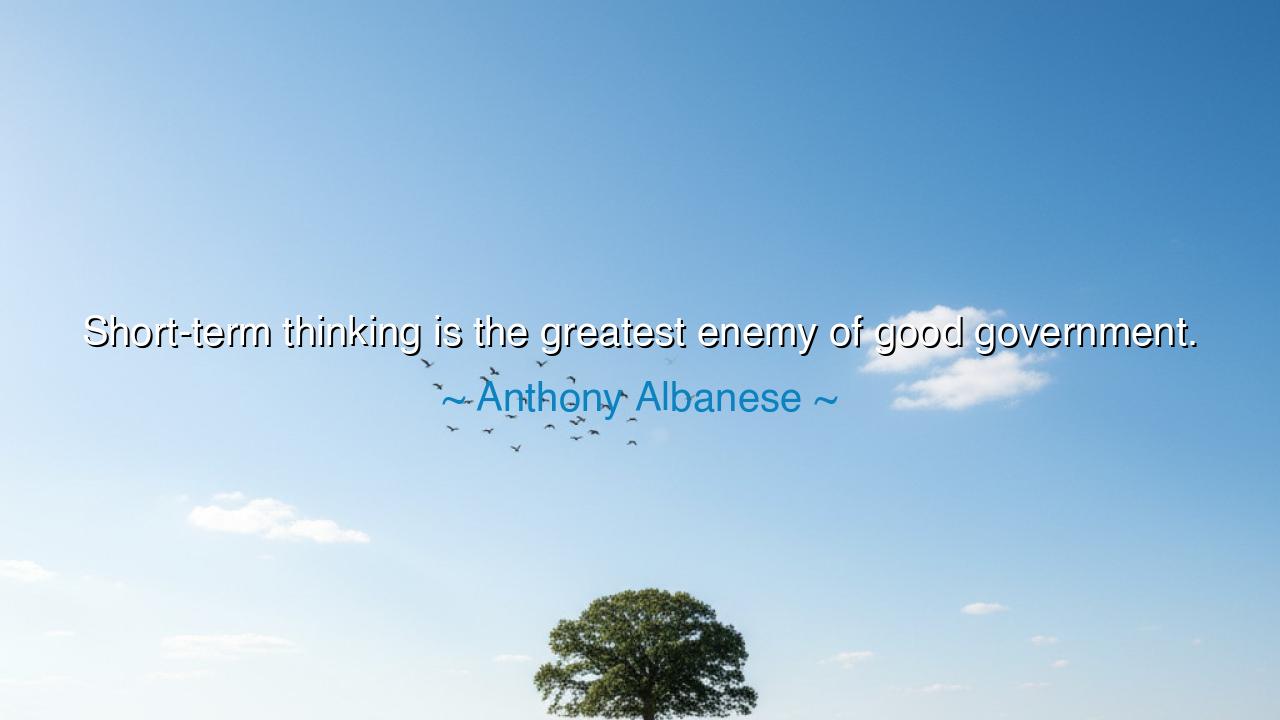
Short-term thinking is the greatest enemy of good government.






When Anthony Albanese declared, “Short-term thinking is the greatest enemy of good government,” he was not speaking merely as a politician, but as a custodian of wisdom. His words carry the weight of centuries — the warning that the fall of empires, the decay of democracies, and the suffering of nations often begin not with malice, but with impatience. In this single truth lies the heart of governance itself: that leadership without vision is but a flicker in the wind, and policies born of expedience will crumble long before the dawn. Albanese’s declaration is not only a call for foresight in politics — it is a call for integrity in all human endeavor, where the future must always be valued above fleeting gain.
The origin of this quote emerges from Albanese’s philosophy of public service and his long career in Australian politics. Having risen from humble beginnings to become Prime Minister, he has witnessed the cost of governments chasing applause over progress, headlines over heritage. In a world ruled by election cycles and media storms, leaders are tempted to act for the moment — to win today rather than build for tomorrow. But Albanese, echoing the wisdom of the ancients, reminds us that good government is an act of stewardship, not spectacle. The truest leader plants trees under whose shade he may never sit; he governs not for his own time, but for generations unborn.
The meaning of his words runs deeper than politics — it is a reflection on the moral nature of responsibility itself. Short-term thinking is not merely a failure of intellect; it is a failure of soul. It sacrifices the permanent upon the altar of the immediate. When rulers pursue profit over principle, when nations value consumption over conservation, when societies measure success by quarterly gain rather than lasting prosperity, the roots of civilization begin to wither. A wise government, like a wise man, looks to the horizon — seeing beyond the storm of the present to the calm of what must be secured for the future.
History offers countless examples of this truth. Consider the ancient Roman Republic, whose early leaders governed with virtue, duty, and vision. They built aqueducts that lasted millennia, laws that defined justice for the world. But as centuries passed, Rome’s leaders began to think not of legacy but of luxury, not of unity but of personal ambition. The Senate traded principle for profit, and emperors squandered their power on spectacle. Bread and circuses replaced wisdom and restraint. What had been the world’s greatest republic fell, not from an enemy’s sword, but from the corruption of short-term thinking.
The same warning can be heard in the modern age. Climate change, poverty, and inequality — these are not the creations of fate, but the consequences of generations of leaders who sought immediate comfort over enduring reform. They postponed the difficult choices, preferring popularity to courage. The earth now bears the scars of their delay. Yet, there have always been those who chose the harder path — leaders who refused to be blinded by the glitter of the moment. Franklin D. Roosevelt, for instance, in the midst of economic despair, built systems like Social Security not for instant praise, but for the enduring dignity of future generations. His foresight, like Albanese’s principle, reminds us that greatness demands patience, and that the rewards of wisdom are reaped only by those who sow in faith.
Albanese’s words are not only for those in high office — they are for every soul entrusted with responsibility. Parents, teachers, artisans, and citizens alike must heed this truth: to think only of today is to betray tomorrow. Every hasty decision, every careless act born of convenience, carries consequences beyond its moment. The wise learn to pause, to weigh, to act not for self or season, but for posterity. For in the long arc of time, the measure of our lives will not be the comfort we gained, but the foundation we left behind.
The lesson is clear and everlasting: patience is the architect of civilization, and foresight its guardian. Good government — and indeed, good living — demands the courage to act not for applause, but for purpose; not for ease, but for endurance. The truest leaders are gardeners of destiny, tending to the soil of tomorrow even as they walk the fields of today. And so, let every generation remember: when we trade vision for vanity, we rob our children of hope.
Let this teaching be passed down: govern — and live — as if the future were watching. For it is. Every policy, every choice, every act of integrity or neglect, becomes the inheritance of those yet to come. To defeat the enemy of short-term thinking, one must see beyond the flicker of the present flame and kindle instead the enduring fire of wisdom — a light that, once lit, will guide not only the living, but the unborn, toward a nobler age.






AAdministratorAdministrator
Welcome, honored guests. Please leave a comment, we will respond soon